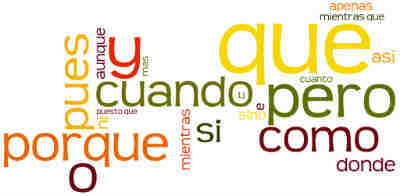|
Cause
|
Do you know how to use Spanish transition words and Spanish transition phrases? These are also known as Spanish Conjunctions. This lesson will begin with Spanish transition words and phrases related to Cause and Effect, it will continue with transition phrases related to Explanation and Clarification, then Similarity and Contrast, followed by Specific and General, and finish with transition phrases related to Introduction and Conclusion.
Cause and Effect Transition Words
a causa de (que) — because of
debido a (que) — due to
por — because of
porque — because
como — because, since
ya que — because, since
puesto que — because, since
dado que — given that así (que) — thus, since
en consecuencia — as a result
como resultado — as a result
por consiguiente — therefore
por lo tanto — therefore
por eso — therefore, for that reason

Explanation and Clarification Transition Phrases
además (de) — besides, furthermore
hay que añadir (que) — it is worth adding
es decir — that is to say
o sea — that is to say
en otras palabras -in other words
esto es — i.e.
Similarity and Contrast Transition Phrases
en cambio — on the other hand, instead
por otra parte — on the other hand
por otro lado — on the other hand
no obstante — nevertheless, however
sin embargo — nevertheless, however
a diferencia de — in contrast to
en contraste con — in contrast to
a pesar de (que) — in spite of, despite
por el contrario — on the contrary
al contrario — on the contrary
en vez de — instead of
con todo — nevertheless, still
pero / sino — but / but rather
aunque — although, even though
así como — similarly
de la misma manera — in the same way
de manera semejante — in a similar fashion
del mismo modo — in the same way
igual que — like + noun
igualmente — similarly
tal como — just as
tanto... como... — both... and...
Specific and General Transition Words
en general - generally, in general
por lo general - generally, usually
generalmente por ejemplo - generally
específicamente - specifically
en concreto - specifically
Introduction and Conclusion Transition Phrases
En primer lugar - First place
Para empezar - To start
En primer término - First thing
Ante todo En conclusión - In short
En suma - In conclusion, all things cosidered
Para concluir - In conclusion, in short
Finalmente - Finally
• You never say "porque de" (because of), it is simply expressed with preposition "por":
por las circunstancias
because of the circumstances
• You never start a sentence with "Porque" (unless you're answering the question "¿Por qué?").
Use "Ya que", "Puesto que", "Como", "Dado que" (Since), when you start a sentence.
• "the result" is said: el resultado. As a result : como resultado
• You never say "un otro", "una otra", simply use: "otro", "otra"
• Atention to conjunctions that start with a preposition: de esta manera, de tal modo, ¿De qué manera?, un modo de...
• The adjective "ambos/as" (both)can only be used to refer to two identical elements: "ambos libros", (both books) "ambas culturas" (both cultures). In order to establish similarity between two different elements you say (both... and...), you must use the invariable expression "tanto... como...":
"Tanto las novelas como los poemas"
Both novels and poems.
"Tanto el amo como el esclavo".
Both the master and the servant.
|
|
Explanation
|
|
Contrast
|
|
General
|
|
Conclusion
|
|
|
|

